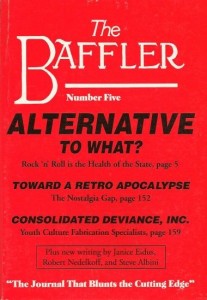July 23, 2014
Rejoice! Baffler archives to baffle the internet
by Mark Krotov
Great news! The Baffler, America’s favorite curmudgeonly left-wing magazine, has unearthed, excavated, and digitized its past. And what a past it is! All of The Baffler’s back issues (which have, in recent years, been hard to track down unless you bought one of the magazine’s excellent anthologies, or, perhaps, spent time in a Gen X-themed amusement park) have now appeared on thebaffler.com, ready to remind a new generation of readers that nothing—nothing!—is safe from cooption.
From its first issue, which was released in the summer of 1988, The Baffler chastised, lampooned, goaded, and eviscerated the excesses of American capitalism and a culture that was all too eager to consume its myths. Over the years, the magazine has published Steve Albini on the corruption of the record industry (though he never did write that sequel); Naomi Klein on the corruption of internet cafes; Tom Vanderbilt on the corruption of Skyy Vodka’s marketing strategy; and many other great writers on topics not necessarily related to corruption. Also, in 1993, Rick Perlstein had this to say about Scooby Doo:
Every episode has the same plot. The Mystery Machine sets out from nowhere to rendezvous with one of the crew’s relatives, who invariably live in some eerie run down old mansion. Here already we can read a socialization of a vital American commercial mythos of rootlessness: Scooby and his comrades don’t seem to come from anywhere, and don’t really seem to be heading for anywhere in particular, either. Like the classic American mythologizers of the open road John Steinbeck, Jack Kerouac, and Ken Kesey, the auteurs Hanna and Barbera present the viewer with the ever-receding ideal of infinite possibility. In Tocqueville’s words, they reproduce the classic American conceit of “forever seeking, forever falling to rise again, often disappointed, but not discouraged, [tending] unceasingly towards that unmeasured greatness so indistinctly visible at the end of the long track [Route 66?] which humanity has yet to tread.” Utopia equals the day after tomorrow. This is the existential American condition we are forever doomed to retread as we fantasize our own eternal youth. In this epic, rather than the destination becoming spiritual wholeness and self-knowledge, the goal, scripted by some demonic Zen master, becomes the futile journey itself. Yikes!
There is much more where that came from, along with excellent writing by dozens of brilliant people, including Melville House writers Steve Almond, David Graeber, and Slavoj Žižek. Read through all of the back issues, and who knows? Perhaps you’ll start a revolution! Though if you do, said revolution will, in all likelihood, be a fairly grumpy one.
Mark Krotov is senior editor at Melville House.
